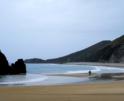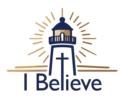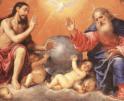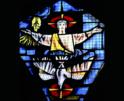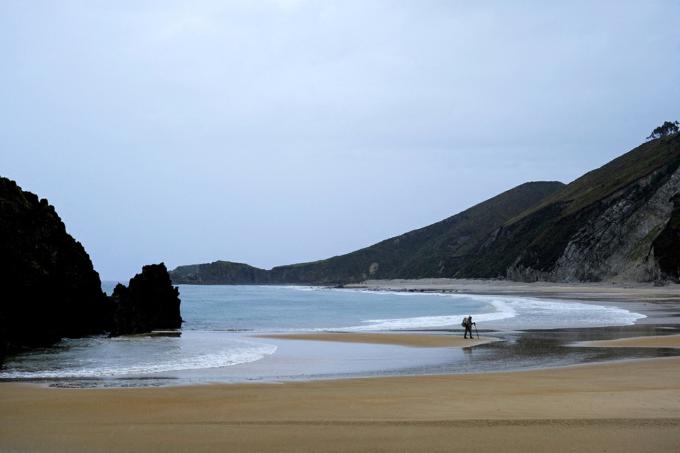
Faith
Whatever questions I had -- spiritual, physical, or mental -- could be managed, if not answered, by walking across Spain.
I've returned to Los Angeles. My knees are still sore -- possibly more from the long flights than from walking. I'm not entirely at rest, but the house is quiet. The dog -- more of a silent presence than I remembered -- lies nearby. No maps to peruse, no bags to pack. And I don't mind the stillness. If anything, I'm more at ease with it now.
This past month, I walked a long stretch of the Camino del Norte, the northern route of the Santiago pilgrimage across Spain. I crossed hills and valleys, Roman bridges, medieval alleyways, coastal farm roads, and modern cities. My mornings had a clear rhythm: wake early, walk until tired, wash clothes, rest, eat, sleep. Repeat. The movement became a kind of solution. Whatever questions I had -- spiritual, physical, or mental -- could be managed, if not answered, by walking across Spain.
Across a varied landscape. I passed through Basque Country, Cantabria, Asturias, Galicia, and more. Each region had its own language, food, customs, and relationship with Madrid. The only consistent structures I saw -- aside from Adidas sneakers -- were Catholic churches. Not just places of worship, but specifically Catholic: stone chapels, baroque cathedrals, renovated monasteries, active seminaries. An infrastructure built centuries ago that remains in place today.
It made me wonder: how did the Catholic Church manage to unify a region so culturally fragmented? Driving past churches in Los Angeles -- Catholic, Protestant, Evangelical, Pentecostal, and Buddhist temples, mosques, yoga studios -- I'm struck by how peacefully fractured our spiritual landscape is here. Spain has its differences, too, but Catholicism remains the dominant religious presence.
Some of that durability, I'd argue, came from adaptability. Early Christianity -- what became Catholicism -- spread not by rigidity but by accommodation. A friend recently joked that Catholics are the most pagan of the major religions. There's truth in that. Catholicism's early strength came from religious syncretism: it dropped the demanding rituals, absorbed local customs, symbols, and deities. Saints mirrored pagan gods. Relics replaced tribal totems. Feasts aligned with solstices and harvests. Even the bones under the Cathedral in Santiago are likely those of a fourth-century Galician bishop whose grave attracted pilgrims along a pre-Christian path to Finisterre -- thought by Romans to be the end of the world. Catholicism didn't ban the pagan pilgrimage; it absorbed and reinterpreted it.
The word "catholic" with a small "c" originally meant "universal." The Greek "katholikos" -- from "kata" (according to) and "holos" (whole) -- meant all-encompassing. When Ignatius of Antioch used it in AD 107, he wasn't talking about Rome's bureaucracy. He was describing a network of believers united not by uniformity but communion. A church that spanned languages and borders.
That openness hasn't always held. The Spanish Inquisition -- which didn't end until the 1800s -- is a reminder of how far things can swing in the other direction. But the church's longevity in Spain still speaks to an early impulse toward inclusion and cohesion.
Pope Leo XIV echoed that in his inaugural remarks: "Let us build a church founded on God's love . . . A missionary church that opens its arms to the world . . . A leaven of harmony for humanity." That's closer to what I saw on the Camino: towns anchored by old churches still ringing their bells, offering not answers necessarily, but continuity -- and a 2,000-year-old framework for what it means to be human: loved, equal, purposeful, and forgiven.
Some lessons I'm bringing back:
The Camino doesn't need to be done all at once. The Norte is difficult. Doing it in stages -- Basque, then Cantabria, Asturias, Galicia -- is not only acceptable but also more interesting.
Learn a few key phrases. Spanish, Basque, French, German, Italian -- any will help. Hello. Where are you from? Where are you going? Cup of coffee please?
You'll have lonely and confusing days. You'll second-guess yourself. Stay calm. Take a break. Make a plan with what you know, and keep walking.
There's time for prayer, but I suggest mastering the art of self-talk, too. Take yourself by the hand if needed, get on the road and keep going. You'll get there.
Enjoy Santiago de Compostela. It's the happiest city I've ever visited -- full of people arriving day after day, each having overcome obstacles and completed a personal individual journey.
Next fall, I plan to return and walk the Camino Primitivo -- the original and perhaps most difficult route over the mountains. 2025 is the Year of the Pilgrims of Hope, and if all goes well, I'll have completed the Frances, Norte, and Primitivo -- the Holy Trinity of Caminos -- by year's end.
For now, I'm here, at my desk, lightening my carry, physically and otherwise. Not just closets and storage bins but the mental weight of holding too much from moment to moment. What do I really need to get where I'm going next? That's the question I'm asking now.
Buen Camino.
Recent articles in the Faith & Family section
-
New comfort with old silenceMark T. Valley
-
'When I was a child'Archbishop Richard G. Henning
-
True Mission is Giving and ReceivingMaureen Crowley Heil
-
Glorious processionsScott Hahn
-
Scripture Reflection for June 15, 2025, Solemnity of the Most Holy TrinityFather Joshua J. Whitfield

